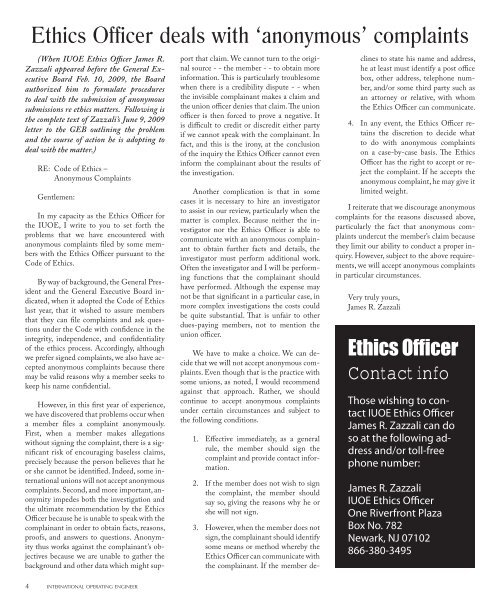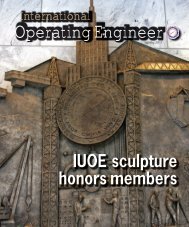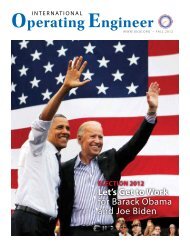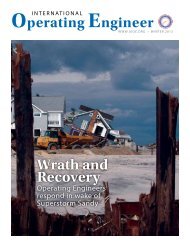Summer 2009 - International Union of Operating Engineers
Summer 2009 - International Union of Operating Engineers
Summer 2009 - International Union of Operating Engineers
You also want an ePaper? Increase the reach of your titles
YUMPU automatically turns print PDFs into web optimized ePapers that Google loves.
Ethics Officer deals with ‘anonymous’ complaints<br />
(When IUOE Ethics Officer James R.<br />
Zazzali appeared before the General Executive<br />
Board Feb. 10, <strong>2009</strong>, the Board<br />
authorized him to formulate procedures<br />
to deal with the submission <strong>of</strong> anonymous<br />
submissions re ethics matters. Following is<br />
the complete text <strong>of</strong> Zazzali’s June 9, <strong>2009</strong><br />
letter to the GEB outlining the problem<br />
and the course <strong>of</strong> action he is adopting to<br />
deal with the matter.)<br />
RE: Code <strong>of</strong> Ethics –<br />
Anonymous Complaints<br />
Gentlemen:<br />
In my capacity as the Ethics Officer for<br />
the IUOE, I write to you to set forth the<br />
problems that we have encountered with<br />
anonymous complaints filed by some members<br />
with the Ethics Officer pursuant to the<br />
Code <strong>of</strong> Ethics.<br />
By way <strong>of</strong> background, the General President<br />
and the General Executive Board indicated,<br />
when it adopted the Code <strong>of</strong> Ethics<br />
last year, that it wished to assure members<br />
that they can file complaints and ask questions<br />
under the Code with confidence in the<br />
integrity, independence, and confidentiality<br />
<strong>of</strong> the ethics process. Accordingly, although<br />
we prefer signed complaints, we also have accepted<br />
anonymous complaints because there<br />
may be valid reasons why a member seeks to<br />
keep his name confidential.<br />
However, in this first year <strong>of</strong> experience,<br />
we have discovered that problems occur when<br />
a member files a complaint anonymously.<br />
First, when a member makes allegations<br />
without signing the complaint, there is a significant<br />
risk <strong>of</strong> encouraging baseless claims,<br />
precisely because the person believes that he<br />
or she cannot be identified. Indeed, some international<br />
unions will not accept anonymous<br />
complaints. Second, and more important, anonymity<br />
impedes both the investigation and<br />
the ultimate recommendation by the Ethics<br />
Officer because he is unable to speak with the<br />
complainant in order to obtain facts, reasons,<br />
pro<strong>of</strong>s, and answers to questions. Anonymity<br />
thus works against the complainant’s objectives<br />
because we are unable to gather the<br />
background and other data which might support<br />
that claim. We cannot turn to the original<br />
source - - the member - - to obtain more<br />
information. This is particularly troublesome<br />
when there is a credibility dispute - - when<br />
the invisible complainant makes a claim and<br />
the union <strong>of</strong>ficer denies that claim. The union<br />
<strong>of</strong>ficer is then forced to prove a negative. It<br />
is difficult to credit or discredit either party<br />
if we cannot speak with the complainant. In<br />
fact, and this is the irony, at the conclusion<br />
<strong>of</strong> the inquiry the Ethics Officer cannot even<br />
inform the complainant about the results <strong>of</strong><br />
the investigation.<br />
Another complication is that in some<br />
cases it is necessary to hire an investigator<br />
to assist in our review, particularly when the<br />
matter is complex. Because neither the investigator<br />
nor the Ethics Officer is able to<br />
communicate with an anonymous complainant<br />
to obtain further facts and details, the<br />
investigator must perform additional work.<br />
Often the investigator and I will be performing<br />
functions that the complainant should<br />
have performed. Although the expense may<br />
not be that significant in a particular case, in<br />
more complex investigations the costs could<br />
be quite substantial. That is unfair to other<br />
dues-paying members, not to mention the<br />
union <strong>of</strong>ficer.<br />
We have to make a choice. We can decide<br />
that we will not accept anonymous complaints.<br />
Even though that is the practice with<br />
some unions, as noted, I would recommend<br />
against that approach. Rather, we should<br />
continue to accept anonymous complaints<br />
under certain circumstances and subject to<br />
the following conditions.<br />
1.<br />
2.<br />
3.<br />
Effective immediately, as a general<br />
rule, the member should sign the<br />
complaint and provide contact information.<br />
If the member does not wish to sign<br />
the complaint, the member should<br />
say so, giving the reasons why he or<br />
she will not sign.<br />
4.<br />
However, when the member does not<br />
sign, the complainant should identify<br />
some means or method whereby the<br />
Ethics Officer can communicate with<br />
the complainant. If the member declines<br />
to state his name and address,<br />
he at least must identify a post <strong>of</strong>fice<br />
box, other address, telephone number,<br />
and/or some third party such as<br />
an attorney or relative, with whom<br />
the Ethics Officer can communicate.<br />
In any event, the Ethics Officer retains<br />
the discretion to decide what<br />
to do with anonymous complaints<br />
on a case-by-case basis. The Ethics<br />
Officer has the right to accept or reject<br />
the complaint. If he accepts the<br />
anonymous complaint, he may give it<br />
limited weight.<br />
I reiterate that we discourage anonymous<br />
complaints for the reasons discussed above,<br />
particularly the fact that anonymous complaints<br />
undercut the member’s claim because<br />
they limit our ability to conduct a proper inquiry.<br />
However, subject to the above requirements,<br />
we will accept anonymous complaints<br />
in particular circumstances.<br />
Very truly yours,<br />
James R. Zazzali<br />
Ethics Officer<br />
Contact info<br />
Those wishing to contact<br />
IUOE Ethics Officer<br />
James R. Zazzali can do<br />
so at the following address<br />
and/or toll-free<br />
phone number:<br />
James R. Zazzali<br />
IUOE Ethics Officer<br />
One Riverfront Plaza<br />
Box No. 782<br />
Newark, NJ 07102<br />
866-380-3495<br />
4<br />
i n t e r n at i o n a l operating e n g i n e e r













